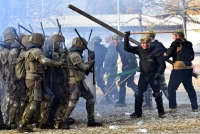The flare-up of violence in Kosovo shows the folly of the west’s appeasement of Serbia
The killing last weekend of a Kosovo police officer by a group of 30 or more heavily armed Serbian nationalist militants marks the most significant security incident in that country, and the western Balkans region, in more than a decade. The US ambassador to Pristina, Jeffrey M Hovenier, described the attack subsequently: “We know it was coordinated and sophisticated … The quantity of weapons suggests this was serious, with a plan to destabilise security in the region”.
Kosovo’s authorities concur and are even more explicit in who they blame. Namely, Serbia’s government, and its strongman president, Aleksandar Vučić.
In the hours after the day-long skirmishes between the militants and police, in which three attackers were reported to have been killed, the office of Kosovo’s prime minister, Albin Kurti, posted photographs of the large cache of seized weapons and munitions.… Seguir leyendo »


